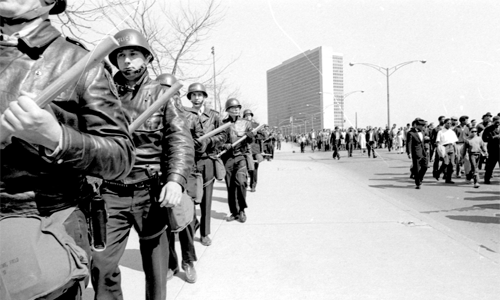The members of the CPRB are appointed for four-year terms and are expected to serve until such time as their successors are chosen. The first three Inaugural terms expired in October 1999, and successors to these seats were appointed to full four-year terms. The incumbents in the remaining four seats were originally appointed to full four-year terms. This facilitated staggered expirations so as to avoid all terms expiring in unison.
As inaugural terms expired and Members departed, a deficiency in the City Code became apparent: a procedure for filling Board vacancies was omitted. City Council amended §662.04 of the City Code by adding:
- In appointing Board members to fill vacancies, if the vacancy has been created by the departure, for whatever reason, of one (1) of the four (4) Board members appointed from City Council’s nominations, the Mayor shall fill such vacancy by appointing the Board member from a new list of three (3) nominations submitted by Council. Nominations must be forwarded to the Mayor no later than thirty (30) days notification to Council by the Board that a vacancy exists. If the Mayor fails to appoint Board members within sixty (60) days of being forwarded nominations, Council shall appoint Board members for any existing Council nominated vacancies. (Amended Ordinance 7-2000, effective 3/09/2001)
The Board requires a quorum of 4 members to conduct business. The staggered expiration of terms imposes a risk when four of the seven seats expire and the incumbent is unable to serve until a successor is appointed. Similarly, if Members have poor attendance, the capacity to maintain a quorum can become fragile. This is an organizational vulnerability that was exploited during the period of 1999 through 2005.
Upon notice that a vacancy existed, neither City Council nor the Mayor responded within the time specified by the City Code to fill the vacancy. At one point in 2003, five of the seven seats were vacant. Nonetheless, the Board’s work continued with case dispositions being held pending the ratification of a quorum, often waiting months for a quorum to be established.
Prior to the departure of the Murphy administration in January 2006, all seats were full and a quorum of Members was seated through October 2009.
A challenge to the nominating and appointing authorities was the selection of two Law Enforcement Professionals (LEP) to serve on the CPRB. While the definition of a LEP is broad, the availability of LEPs willing to serve proved to be controversial and difficult.
Prominent retired Pittsburgh police officers succeeding the inaugural LEP member were either hostile to the Board’s purpose or were intentionally appointed to thwart the Board’s effort to fulfill its mission.
One LEP filled a vacancy created by the departure of another LEP and never attended a meeting. This seat had no representation at CPRB meetings or complaint related proceedings from May 2003 through October 2005.


